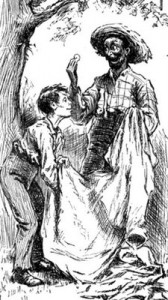Shelley Fisher Fishkin has scored a lot of “firsts” with Twain – we wrote about her rediscovery of a long-lost Twain play Is He Dead? some time ago here. In a recent interview in the journal Americana here, she discusses her lifelong partnership with the author.
Her adventures began shortly after her 1988 From Fact to Fiction: Journalism and Imaginative Writing in America was published:
My first wild adventure with Mark Twain happened shortly before that book was published. I was infuriated by the efforts of a black educator named John Wallace to close down a production of Huck Finn at the Goodman Theatre in Chicago, and to take the book out of the nation’s schools, on the grounds that the novel and its author were racist. (He wanted to replace Twain’s book with his own edition of it – which, like the recent New South Books edition, replaced every use of the word “nigger” with “slave.”)
I wrote an op-ed that the New York Times published on the 100th anniversary of the publication of Huck Finn in the U.S. I observed that Mark Twain had had to turn to satire in the first place because his direct exposés of racism (towards the Chinese in San Francisco) were censored; but now he faced the prospect of censorship once again because some readers couldn’t understand his irony.
 The day that op-ed appeared in the Times, I was awakened by a phone call. A woman said, “I don’t know you, but I just read your piece in the New York Times, and I’ve got to see you right away. I have a letter Mark Twain wrote that nobody knows about yet, and after reading your column, I know you’ll know what to do with it. Here’s what it says.” She read me the letter over the phone. A chill went through me as I realized that the letter contained the only direct, non-ironic condemnation of racism that we had from Twain during the period in which he published Huck Finn. Indeed, it was written the same year that Huck Finn was published.
The day that op-ed appeared in the Times, I was awakened by a phone call. A woman said, “I don’t know you, but I just read your piece in the New York Times, and I’ve got to see you right away. I have a letter Mark Twain wrote that nobody knows about yet, and after reading your column, I know you’ll know what to do with it. Here’s what it says.” She read me the letter over the phone. A chill went through me as I realized that the letter contained the only direct, non-ironic condemnation of racism that we had from Twain during the period in which he published Huck Finn. Indeed, it was written the same year that Huck Finn was published.
The woman who called me was an antiques dealer who had found it in an old desk. I authenticated the letter and I researched its context single-mindedly over the next few weeks, reconstructing a story that ended up intriguing others as much as it fascinated me: Warner T. McGuinn, the young black law student Twain wrote about in the letter, a young man whom he would end up funding through his own private “affirmative action” plan, went on to become a major civil rights lawyer who was a mentor to Thurgood Marshall. The story (which the New York Times ran on its front page) got huge national and international attention.
 The discussion includes the book that made her a Twain superstar, her 1993 book Was Huck Black? Mark Twain and African-American Voices:
The discussion includes the book that made her a Twain superstar, her 1993 book Was Huck Black? Mark Twain and African-American Voices:
I was somewhat astonished by the ruckus it caused! Why should people have been so surprised by the idea that black and white writers and speakers had been shaping each other’s work throughout our nation’s history? Segregated lunch counters may have disappeared in the 1960s, but segregated syllabi were still alive and well in the 1990s. In the early 1990s, there were “American Literature” courses, which were populated almost completely by “white” writers, and there were “African-American Literature Courses” that focused on writers who were invariably “black.” My book challenged the usefulness – and accuracy – of those segregated silos. …
If I were to have the chance to write Was Huck Black? Mark Twain and African-American Voices, again, I would do one thing differently: I would explain the title. It was a mistake to assume that everyone would know that my title was signifying on the “one-drop rule.” Some of my critics ridiculed my argument by charging me with denying that any white voices had shaped Huck’s voice in the book, which is preposterous. My title was simply playing with the idea that if we applied the “one-drop rule” to culture, and if Huck’s voice was shaped at least in part by black voices, then Huck was “black.” I should have said so.
Tags: "Shelley Fisher Fishkin, John Wallace, Mark Twain, Thurgood Marshall, Warner T. McGuinn


